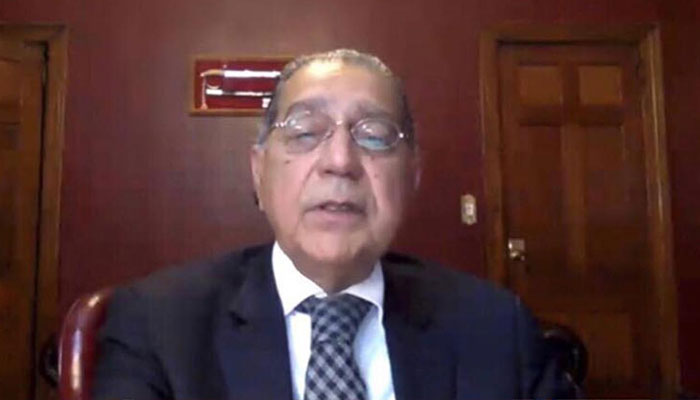‘Trafficking of counterfeit medicines poses biggest challenge to sustainable development’
New York: Trafficking of medicinal products poses one of the biggest challenges to sustainable development amid the coronavirus pandemic, Ambassador Munir Akram said on Saturday.
“Some of the largest current threats to sustainable development emanate from crimes against the environment and, [one] in the context of the COVID-19 pandemic, is the trafficking of counterfeit medical products,” Akram, who is the permanent representative of Pakistan to the United Nations, said during a virtual ministerial meeting.
The even commemorated 20 years of the UN convention against transnational organized crime and its protocols (UNTOC), according to an official statement.
“Two decades later, UNTOC remains the only global legal instrument against transnational organised crime, accompanied by its three protocols to prevent and counter: trafficking in persons, smuggling of migrants; and the illicit manufacturing of, and trafficking in, firearms,” he said.
Ambassador Akram said organised crime and illicit financial flows remain a chronic and ubiquitous problem for many developed and developing countries.
“Like all other aspects of our daily lives, the impact of Covid-19 impact on transnational organised crime has been significant,” he said. “Corruption and various forms of illicit trafficking and migrant smuggling continue to undermine the rule of law, economic development and the livelihoods of people.”
The ambassador asked the member states to strengthen their coordination and cooperation to effectively prevent, investigate and prosecute transnational organised crime. “In the context of Covid-19, there is a need to criminalise corruption and laundering of proceeds of crime related to manufacturing and trafficking of falsified medical products and strengthen international cooperation,” he said. “Second, environmental crimes and ever-growing illegal trade in wildlife – which could lead to other zoonotic diseases – must be dealt on priority basis. Third, change in labour and migration laws is also critical in addressing the demand for the services of human traffickers.”
Akram said the bleeding of the resources developing countries through illicit financial flows must be halted. “It is nothing short of criminal to allow such flows to continue during this crisis when developing countries are already struggling to overcome the challenges posed by shrinking fiscal space to fight the pandemic and achieve the SDGs [sustainable development goals].”
“The COVID-19 crisis must not become an accelerator for criminal activity. We should recommit ourselves to stop criminals from compromising the world’s COVID response and recovery and the realization of the SDG. Coordinated approaches to preventing and combating transnational organised crime are critical to recover better from the crisis, help achieve peaceful and inclusive societies, and make progress towards all of the sustainable development goals.” Ambassador said the reality of organized crime remains complex and multifaceted, but at its core is the objective of organized criminal groups to obtain illicit profits and control markets of illicit goods and services. “Apart from social and economic disruption, criminal activities retard and reverse development gains.
-
 Kanye West's Last Measure To Save Bianca Censori Marriage As He Tries To Salvage Image
Kanye West's Last Measure To Save Bianca Censori Marriage As He Tries To Salvage Image -
 Kim Kardashian Finally Takes 'clear Stand' On Meghan Markle, Prince Harry
Kim Kardashian Finally Takes 'clear Stand' On Meghan Markle, Prince Harry -
 Christina Applegate Makes Rare Confession About What Inspires Her To Keep Going In Life
Christina Applegate Makes Rare Confession About What Inspires Her To Keep Going In Life -
 Patrick J. Adams Shares The Moment That Changed His Life
Patrick J. Adams Shares The Moment That Changed His Life -
 Selena Gomez Getting Divorce From Benny Blanco Over His Unhygienic Antics?
Selena Gomez Getting Divorce From Benny Blanco Over His Unhygienic Antics? -
 Meet Arvid Lindblad: Here’s Everything To Know About Youngest F1 Driver And New Face Of British Racing
Meet Arvid Lindblad: Here’s Everything To Know About Youngest F1 Driver And New Face Of British Racing -
 At Least 30 Dead After Heavy Rains Hit Southeastern Brazil, 39 Missing
At Least 30 Dead After Heavy Rains Hit Southeastern Brazil, 39 Missing -
 Courtney Love Recalls How ‘comparison’ Left Marianne Faithfull ‘broken’
Courtney Love Recalls How ‘comparison’ Left Marianne Faithfull ‘broken’ -
 Pedro Pascal Confirms Dating Rumors With Luke Evans' Former Boyfriend Rafael Olarra?
Pedro Pascal Confirms Dating Rumors With Luke Evans' Former Boyfriend Rafael Olarra? -
 Ghost's Tobias Forge Makes Big Announcement After Concluding 'Skeletour World' Tour
Ghost's Tobias Forge Makes Big Announcement After Concluding 'Skeletour World' Tour -
 Katherine Short Became Vocal ‘mental Illness’ Advocate Years Before Death
Katherine Short Became Vocal ‘mental Illness’ Advocate Years Before Death -
 SK Hynix Unveils $15 Billion Semiconductor Facility Investment Plan In South Korea
SK Hynix Unveils $15 Billion Semiconductor Facility Investment Plan In South Korea -
 Buckingham Palace Shares Major Update After Meghan Markle, Harry Arrived In Jordan
Buckingham Palace Shares Major Update After Meghan Markle, Harry Arrived In Jordan -
 Demi Lovato Claims Fans Make Mental Health Struggle Easier
Demi Lovato Claims Fans Make Mental Health Struggle Easier -
 King Hospitalized In Spain, Royal Family Confirms
King Hospitalized In Spain, Royal Family Confirms -
 Japan Launches AI Robot Monk To Offer Spiritual Guidance
Japan Launches AI Robot Monk To Offer Spiritual Guidance




